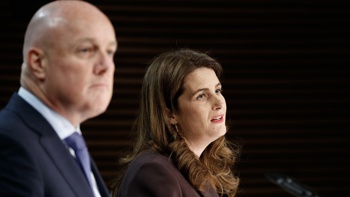
Former Labour Finance Minister Sir Michael Cullen will chair the government's Tax Working Group.
The group will focus on improving the "structure, fairness and balance of the tax system", Finance Minister Grant Robertson announced today.
Robertson and Revenue Minister Stuart Nash have announced details of the government's Tax Working Group, which will eventually make recommendations on new taxes aimed at cooling the housing market.
"At the moment the tax system appears unfair - for example, it doesn't treat income from speculation in housing as it does income from work," Robertson said.
"Individual wage-earners, businesses, asset-owners and speculators should pay their fair share of tax. Right now we don't think that is happening."
He said the group was not about increasing income tax or GST, but rather introducing more fairness as well as contributing to positive environmental outcomes.
Other members of the group will be announced before Christmas and will include a diverse range of tax and finance experts, Robertson said. Final recommendations are expected by February 2019, but significant changes would not come into force until the 2021 tax year - as promised on the election campaign.
Certain areas will be outside the group's scope, including increasing income tax rates, the rate of GST, inheritance tax and changes that would apply to the family home or the land beneath it.
Just over a week before the election Labour decided to delay any implementation of changes from its tax working group until after the 2020 election in a bid to stop any further political damage from its tax policy.
Jacinda Ardern had previously said she would maintain the right to make changes before the next election, given the urgency of the housing crisis.
However, with National going on the attack over what new taxes might be implemented Labour responded by pledging no action until after 2020.
Labour could still legislate for new taxes in its first term - but they would not come into effect until 2021.
Measures to help address housing prices will be the focus of the group, although Labour has already ruled out a capital gains tax applying to the family home or to the land under the family home. It has also ruled out an inheritance tax.
The group will have its first meeting no later than February 2018. Its terms of reference include having a special regard to housing affordability and an instruction to consider a capital gains tax or land tax that does not apply to the family home or the land underneath it.
The group's objectives include having a "sustainable revenue base to fund government operating expenditure" of about 30 per cent of GDP, as well as:
• A tax system that is efficient, fair, simple and collected
• A system that promotes the long-term sustainability and productivity of the economy
• A system that treats all income and assets in a fair, balanced and efficient manner, having special regard to housing affordability
• A progressive tax and transfer system for individuals and families, and
• An overall tax system that operates in a simple and coherent manner.
The working group should report to the government on:
• Whether the tax system operates fairly in relation to taxpayers, income, assets and wealth
• Whether the tax system promotes the right balance between supporting the productive economy and the speculative economy
• Whether there are changes to the tax system which would make it more fair, balanced and efficient
• Whether there are other changes which would support the integrity of the income tax system, having regard to the interaction of the systems for taxing companies, trusts, and individuals.
In examining the points above, the working group should consider in particular the following:
• The economic environment that will apply over the next 5-10 years, taking into account demographic change, and the impact of changes in technology and employment practices, and how these are driving different business models,
• Whether a system of taxing capital gains or land (not applying to the family home or the land under it), or other housing tax measures, would improve the tax system.
• Whether a progressive company tax (with a lower rate for small companies) would improve the tax system and the business environment, and
• What role the taxation system can play in delivering positive environmental and ecological outcomes, especially over the longer term.
The following are outside the scope of the working group's review:
• Increasing any income tax rate or the rate of GST
• Inheritance tax
• Any other changes that would apply to the taxation of the family home or the land under it, and
• The adequacy of the personal tax system and its interaction with the transfer system (this will be considered as part of a separate review of Working for Families).
In addition, the focus of the working group should not be on more technical matters already under review as part of the Tax Policy Work Programme, including:
• International tax reform under the Base Erosion and Profit Shifting agenda, and
• Policy changes as part of Inland Revenue's Business Transformation programme.
Take your Radio, Podcasts and Music with you









